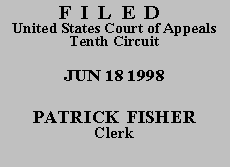

| BOBBY FRANKLIN WASHINGTON,
Petitioner-Appellant, v. STATE OF OKLAHOMA; KEN KLINGER; JAMES L. SAFFLE, Respondents-Appellees. |
|
Bobby Franklin Washington appeals the district court's dismissal of his petition for writ of habeas corpus under 28 U.S.C. § 2254. He contends his state convictions on various drug trafficking charges are invalid, arguing the nighttime search of the residence where he was staying violated the Fourth Amendment. An appeal cannot be taken to this court in a § 2254 proceeding unless the petitioner has obtained a certificate of appealability by making a substantial showing of the denial of a constitutional right. See 28 U.S.C. § 2253. We deny a certificate of appealability and dismiss the appeal.
Washington argues that the warrant relied upon to search his premises was defective because the authorizing judge did not find the nighttime search permissable based on the "likelihood that the property named in the search warrant will be destroyed, moved or concealed," quoting Okla. Stat. Ann. tit. 22 § 1230. The warrant stated, in the handwriting of the authorizing judge, that the nighttime search was authorized "to prevent further loss distribution or consumption of evidence." Appellant's App. at 003. At the suppression hearing, the trial judge found that the handwritten language was intended by the authorizing judge to be his finding as required by the statute. See id. at 015. The nighttime search issue was the only issue Washington argued on direct appeal. His convictions were summarily affirmed by the Oklahoma Court of Criminal Appeals. See id. at 212-13.
Fourth Amendment exclusionary rule claims are not cognizable in federal habeas corpus proceedings if the petitioner had an opportunity for full and fair litigation of the claim in state court. See Stone v. Powell, 428 U.S. 465, 494 (1976). The record of Washington's proceedings in state court indicates he challenged the constitutionality of the nighttime search both through a suppression hearing in the trial court, and as the only issue raised in his direct appeal. The state courts decided his claim on the merits, concluding that the warrant was not defective and that the nighttime search was lawful. Washington had a full and fair opportunity to litigate his Fourth Amendment claim in state court, and federal habeas relief cannot be granted on that ground.
In an effort to avoid the bar of Stone v. Powell, Washington argues that his case presents a more general due process violation because the Oklahoma state courts arbitrarily failed to follow Oklahoma law relative to nighttime searches.(1) He characterizes his position as one challenging the fairness, integrity, and legitimacy of the judicial process, citing Rose v. Mitchell, 443 U.S. 545, 562 (1979), and thus not subject to the strictures of Stone v. Powell. We do not view Washington's situation so broadly.
In reality, Washington is aggrieved because two state courts found against him on his defective warrant claim. His efforts to couch this situation as presenting a federal due process matter and as one challenging the fairness and integrity of the state judicial process are unavailing. His claim is the same as other garden variety Fourth Amendment claims, barred by Stone from consideration as a basis for federal habeas relief where, as here, petitioner had a full and fair opportunity to litigate his claim in the state courts.
Indeed, as a more general matter, a federal court cannot grant a habeas application by a state prisoner if the claim was decided on the merits in state court, unless the decision was contrary to or involved an unreasonable application of clearly established federal law as determined by the Supreme Court or was based on an unreasonable determination of the facts in light of the evidence presented in state court. See 28 U.S.C. § 2254(d). The state trial court's conclusion that the search warrant complied with state statutory requirements does not meet that standard and thus cannot serve as a basis for relief under § 2254. See § 2254(d).
We DENY a certificate of appealability and DISMISS the appeal. The mandate shall issue forthwith.
Entered for the Court
Circuit Judge
*. This order and judgment is not binding precedent, except under the doctrines of law of the case, res judicata, and collateral estoppel. The court generally disfavors the citation of orders and judgments; nevertheless, an order and judgment may be cited under the terms and conditions of 10th Cir. R. 36.3.
1. Given the specific nature of the handwritten language on the search warrant in this case, and its closeness to the statutory language, petitioner's case is distinguishable from those Oklahoma cases cited in his brief. The almost-perfect compliance with the statutory dictate here also distinguishes his case from Fetterly v. Paskett, 997 F.2d 1295, 1299 (9th Cir. 1993), where the sentencing judge in a capital case clearly failed to follow the statutory balancing procedures required by state law.